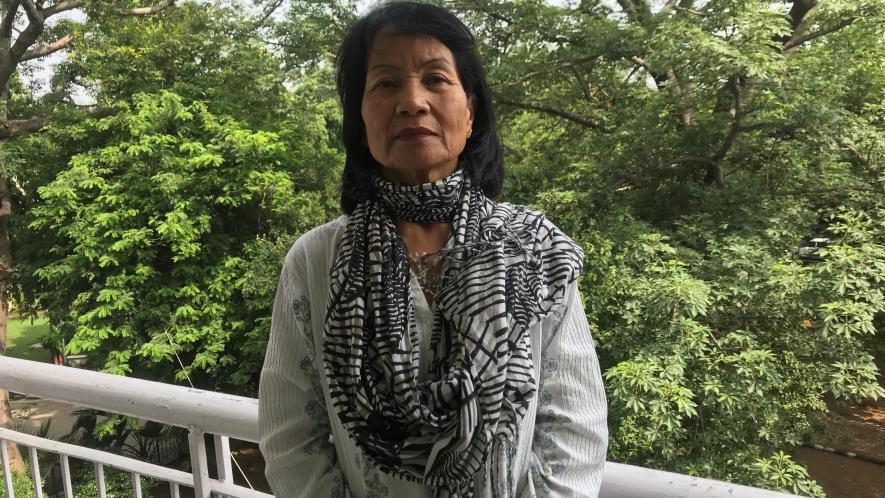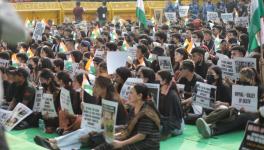People say Arambai Tenggol and Meitei Leepun are RSS Creations: Kim Gangte

Kim Gangte in Delhi in the last week of June.
When violence broke out in May, Kim Gangte, Manipur’s first woman Member of Parliament from the Outer Manipur constituency, bolted the door to her Imphal home, locked its gate, and melted into a crowd fleeing for life. She now lives in temporary accommodation in Delhi. Despite her ordeal, in an interview with NewsClick, Gangte unhesitatingly says she loves the Meitei community—and believes they love her too. Gangte says the BJP, in power in Manipur and at the Centre, drove a wedge between the Meitei people and the Kuki community, to which she belongs. Edited excerpts:
You were in a makeshift camp from where the Army rescued you and hundreds of others. How would you describe that experience?
Until the Army came, we felt we were trapped in a hijacked plane. We had not slept or eaten, and many had lost their homes and loved ones. A distant relative helped his parents escape, but a mob thrashed him and threw him into his burning house. Many people in the camp had such experiences.
Did you see any attackers or mobs?
I saw mobs of hundreds and even thousands of men and women from the terrace of my home. So many that even the Army could not protect the victims from the attackers.
Were they civilians? Uniformed?
Civilians joined the mobs, but the Arambai Tenggol led them in their black outfits and red epaulettes. Somebody told me on the night of 3 May that the [State police] commandos were coming. I thought, ‘Good!’ But people said the commandos would kill us and burn more houses! And then these incidents occurred.
Did Meiteis live in your colony?
There were some Meiteis—and let me tell you, all Meiteis are not bad. There are very good people among them. I think the problem is the militant groups, which called Kukis foreigners, refugees, poppy-planters, illegal immigrants, and attacked them. I believe these incidents were preplanned; how else were all colonies where Kukis live attacked simultaneously on 3, 4 and 5 May?
Otherwise, the Meitei women used to help me so much and always supported me. I called them mother, friend, and sister. They were very loving. I don’t know what went wrong this time, but I think they are being misled.
Do you recollect any change in the attitude of Meitei women towards you or others?
No, I had a very good rapport with everyone, Kuki, Meitei, and Naga.
But there was discrimination. Kukis in Imphal Valley were not treated as equals...
...by the government! I did not find that the Meitei people discriminated [against tribals]. I feel someone put a wedge between us. Some years back, I brought 35 Meitei, Naga and Kuki women to Delhi for a meeting. One of them, a Meitei, runs a tea stall in my locality. Whenever I visited her, we would be so happy—she wanted to go to Delhi again, and I promised to find a way.
I heard that when this woman saw some Meiteis looting Kuki homes recently, she scolded them. She shouted at people taking away beds, TVs, dressing tables or almirahs that they had first chased away the Kukis and were now looting their properties! But, I heard some Meitei women later came and vandalised her tea stall. So, there are angel-like Meitei women whom I love so much, and I think they love me too. But something has gone very wrong.
Many blame the BJP for what has happened.
I blame [the BJP] too.
Is it because the BJP is in power? Or is it the Manipur Chief Minister, Biren Singh, whom you blame?
I am shouting at the top of my voice and blaming the BJP because it has the RSS, which has its own agenda. People say Arambai Tenggol and Meitei Leepun [Meitei militant groups] are all RSS [creations]. When the State administration has failed, why is the central government so reluctant to impose President’s Rule? A Prime Minister should not look at his party first but the country and his people.
Since you mentioned RSS, do you mean the violence has a religious colour?
You cannot exclude religion from this violence. Initially, I thought they were attacking religion because they burned the churches, then houses, and then started killing. Now, to suit their narrative, they say it is a clash between Kukis and Meiteis. No! Because most of the Meitei churches, if not all, have been burned down by Arambai!
They also talk about poppy plantations, illegal immigrants, refugees and foreigners. So, it is very complex, but I want to stress: Does anybody have a right to attack anyone because he is a foreigner or immigrant? It is the government’s duty to detect any illegal immigrants entering our country. It is not the duty of a civilian to go and kill that person. And it is not only the Kukis; even Nagas and Meiteis come from outside. So why were the Kukis singled out?
Do Meitei militant groups see themselves as more strident believers in Hinduism?
Yes, but there is more. On the outside, it appears they are very much Hindus and want Hinduism protected. But, inside, there is Sanamahei, which they wish to return to. But religion is an individual’s decision. If Meiteis want, nobody stops them, but there is no need to kill others, right? It is my conscience, my relationship with God, and my decision. Freedom of conscience is enshrined in our Constitution, so why is the central government quiet—is it just ignoring the people of Manipur and Northeast? ‘Let them suffer! Let them kill one another! As long as India remains intact, it’s OK; let them die.’ I do not know whether the central government thinks this way.
Some would argue Kukis were throwing Meiteis out of hill areas after the High Court ruling of 27 April, and there was retaliation...
Oh, yes, I must explain that. A group of Meiteis wanted to be included in the Scheduled Tribe list. But the tribals in Manipur feel they have been exploited for a very long because they are very backward. Most hill people live in the hill districts and very few Kukis are wealthy. Yes, many are IAS and IPS officers, but these are the lucky ones living in and around Imphal. Just because of a few officers in Imphal, you cannot say tribals are rich!
Also, all tribals—not only the Kukis, even the Nagas—have the grievance that the Autonomous District Councils (ADCs) have not been implemented. There has been no election to these councils since 2010, though it is supposed to happen every three years. Still, despite their problems, the tribals in Manipur were quite happy.
Anyway, apart from the Memorial Gate incident at the end of the ATSUM rally in Churachandpur, I heard that a Meitei truck driver hit a roadside tea and mineral water stall meant for participants. I heard people lost their temper and beat up this driver, which they should not have done. And I heard this guy returned with his people and burned Kangvai village. After this, Kukis also started burning Meitei village[s]. But we in Imphal knew nothing about what was going on!
Is it Chief Minister Biren Singh whom you consider the problem or the Centre?
Both are responsible. [Chief Minister] Biren Singh had been calling Kukis “Burmese Kukis”, poppy-planters, even before 3 May. That is very unbecoming of a Chief Minister. I agree, some areas in the hills have poppy plantations, but Nagas also plant it—why does he never mention that? And the Kuki farmers are so poor; how would they have raised money for plantations?
Is land behind this conflict? Is productive activity possible in the hills where tribals live?
I do not think Meiteis will ever stay in the hills. Because I am a Kuki and even I could not stay there. So how would the Meiteis who have been living in the Valley?
Why could you not stay in the hills?
No roads. No bridges. No schools. No colleges. No hospitals. What would you do? We come to the Valley not because we want to but because of hospitals, schools, universities, and jobs.
When you were an MP, did you notice reasons for no development in hill areas?
In a democracy, what is important is the numbers game. The Meiteis are economically and politically advanced and have 40 members in a House of 60. Only 20 seats are for the hill people, of which 19 are reserved. The hills are 90% of Manipur’s area. First, it is a very difficult job to bring development to the mountains because of the terrain and other environmental issues. Second, usually, these elected members are not chosen by the people.
I don’t understand.
You see, the leaders are pre-selected by the underground, today known as SoO groups [armed outfits that signed Suspension of Operation agreements with the government], in collaboration with the central and State governments. Before elections, the government holds meetings in Delhi or Guwahati with the SoO groups. Together, they agree on candidates, and the government gives the ticket to these selected ones. People had no choice in their leadership, and I would say, till today, they have no choice.
In this election also, the BJP made many promises if it gets elected and forms the government. Now, SoO group leaders have come out in the open and said they were betrayed, killed, and then accused [of violence]. That is why I said on a TV channel that I am a victim; I want the mainland to know what’s going on.
You are a victim in what sense?
Well, one [SoO] group supporting the BJP candidate kidnapped me—and there are many other victims. Those who wanted to contest elections had no chance because they did not get selected by some SoO groups and the BJP government. This [violence] is the result of their work. It is their agenda.
So, the conflict is about the tribals’ struggle for development and rights, mixed with religion, land politics and electoral calculations?
That is what I am saying. There is religion, but they do not want it to come out in the open because the BJP would get accused of intolerance.
But I do not blame any community. I blame the BJP government at the Centre and in the State. Because who is arming the [attackers in the] Valley? Who is funding the SoOs and their salaries? It is the government. The SoO groups are no longer underground. They have come up and talked to the State and Central governments. They have been given designated camps and deposited their weapons [with the government].
So why is the State government calling the Kuki SoO groups “terrorists”? Yesterday, you used them as your volunteers to form a government. And today, to fit your narrative, you are calling them terrorists? Is it so that the Indian government can see them as terrorists and send the Army to kill them?
Can you return to Imphal?
I do not think it would be possible right now. It is state-sponsored terrorism, and we live in a reign of terror—in some police training centres, people who called themselves civilians were given weapons and ammunition. I am really surprised that Union Home Minister Amit Shah came and said, ‘Please return those weapons’. That is like asking back what you gave once the job is done!
But Kukis blocked roads and stopped food commodities from reaching Imphal.
It is very true, yes, I agree, but this is what happens in any tit-for-tat situation. It is really not good, but I would return to this point—the central and the state governments are playing divide-and-rule among their people. That is the reason for [this conflict], and it will not be easy to resolve. I also want to drive home that the Kukis and the Meiteis lived together, even in the hill districts.
In Parliament, I spoke for all my people—Kukis, Nagas, Meiteis—everyone. With tears in my eyes, I fought human rights violations and the Disturbed Areas Act. And today, I have nowhere to go. Our closely-knit social fabric has been broken down. And I don’t know how we will cement this again.
What do you think about the administrative separation idea?
Neither Kuki nor Meitei, I think, would like to separate—not even the SoO groups.
Why?
Because everyone loves Manipur, no? We are all very close, but some hidden agenda has broken us into pieces.
Kuki MLAs have said they want separately administered Kuki areas.
The situation compels the MLAs to say this because safety and security dictate their immediate choices. Things would have been better if tribal areas had full-fledged autonomy and working district councils. Today, whether Kukis like it or not, I want my Manipur to be one, and we can then try to develop the state. Also, I don’t think asking for a separate administration is something new. Autonomous District Councils, directly supervised, monitored and financed by the central government, are a distinct administration under the law. Holding elections to them was in the hands of the government, but it just ignored the demands.
If co-existence comes with the condition that Meitei gets something like tribal status, would it be acceptable?
The thing is, not all the Meiteis are asking for tribal status, just some sections.
And what do you think about the peace committee?
Everybody rejected it because they did not have faith in the chief minister. Even many Meiteis and some BJP MLAs say he should be changed. Can the Chief Minister, who was instigating [the violence], remain in his position and talk about peace?
You feel that way.
I am one of the tribals who has been very close with the Meiteis. So it is not that I feel—I saw commandos burning [Kuki’s properties] with my own eyes.
But you would support steps towards peace.
We are all for peace, no? If I am not for peace, I will be for war—and war is something I do not like.
Everybody will say they are for peace, even the chief minister. What would count as a step towards peace?
Yes, we are all for peace; Kukis are for peace, though they were exploited for so long. Tribal students held their rallies together, but the Nagas kept quiet while the Kukis were targeted, killed and displaced. So, the Kukis have every reason to be upset with the Nagas, but they have said nothing. Kukis have reasons to be angry, but anger will not solve the problem. It is our strategy, how we go about it, that will bring peace.
We count ourselves as lucky today because we are still alive. The only thing keeping us alive is people who still listen to us. It is like the time of Hitler for the Kukis in a country where we all had dreams. We thought we could reach the stars, and today we are here like this.
Get the latest reports & analysis with people's perspective on Protests, movements & deep analytical videos, discussions of the current affairs in your Telegram app. Subscribe to NewsClick's Telegram channel & get Real-Time updates on stories, as they get published on our website.
























